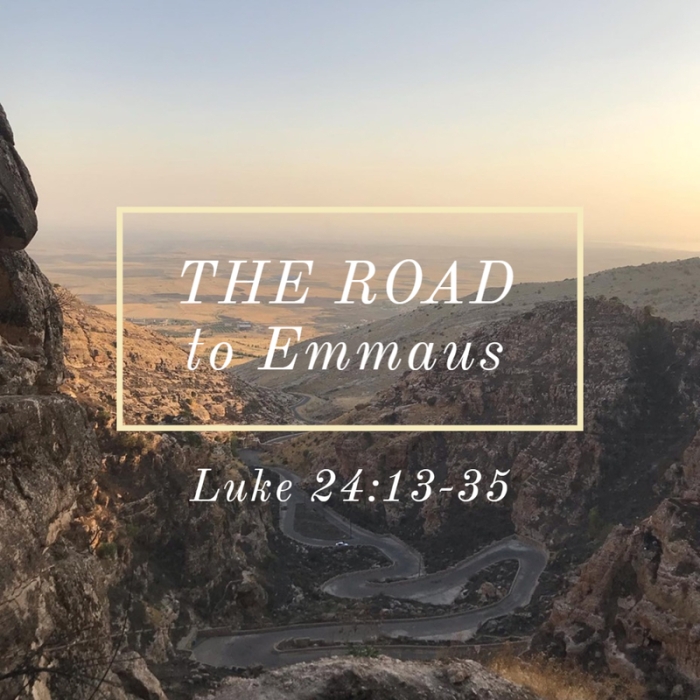
With the COVID-19 restrictions in place I’m seeing a lot of people out for walks. It’s good to see because getting outside and engaging in some exercise helps both our physical and mental health. There is also a social aspect to walking with someone which is very important for us. When other ways of socially connecting have been cut off, walking with someone can have a lot of benefits for us.
Sometimes I wonder what people talk about while they walk. They might be catching up on what’s been happening in their lives, talking about who has been doing what, or maybe discussing the weather. I wonder whether their conversations ever go deeper to the more meaningful things such as their struggles or hopes, their joys or disappointments, maybe even to questions of faith.
I can understand why two of Jesus’ disciples, as they were walking the 11 or 12 kilometres from Jerusalem to Emmaus, were discussing the events of Jesus’ suffering, death and the rumours of his resurrection (Luke 24:13-35). It was the day of Jesus’ resurrection and they had a lot to process. Their conversation began with the events that had happened, but when Jesus turned up, even though they didn’t recognise him, he took the conversation to a whole different level. We read in verse 27 that,
Jesus took them through the writings of Moses and all the prophets, explaining from all the Scriptures the things concerning himself. (NLT)
Jesus didn’t just talk with them about what had happened. Jesus talked with them about the meaning behind his suffering, death and resurrection from the grave. Luke tells us that Jesus explained the meaning of Scriptures to them and how they pointed to him. The word Luke uses is the word from which we get our English word hermeneutic which is about interpreting or finding the meaning of something. In ‘opening’ the Scriptures to the disciples (v32 NIV) Jesus was interpreting the words of the Bible for them and giving these new meaning for the disciples’ lives.
As we journey through the impact that COVID-19 is having on our world, this story is significant for us in a few ways. Firstly, like these two disciples, we are moving into an uncertain future. They didn’t know what the future had for them after their teacher’s crucifixion and rumoured resurrection. The road to Emmaus can be understood as a metaphor for travelling into an uncertain future. In the same way, we don’t know how long the COVID-19 restrictions will be in place or what life will be like when the start to be relaxed. We are on our own road, travelling into an uncertain future.
Like the disciples, we do not travel alone. Our risen Lord Jesus walks with us into this uncertain future. We may not always recognise his presence, just like the two disciples in the story, but not recognising him doesn’t mean he’s not there. We might be feeling isolated and missing the contact with other people but Jesus continues to walk with us in a spiritual way as well as a more tangible way. As we live out our identity as the body of Christ in our relationships with each other, and as we remain connected as the Church, we embody Jesus’ presence with each other as we travel through this time together. As we walk together through these restrictions, Jesus walks with us, whether or not we recognise his presence.
As we travel with Jesus, we can be listening to him open up the words of Scripture for us. We can read the Bible as a book which communicates information to us about events of the past, kind of like the way the two disciples were talking about the events of Easter at the start of this story. However, there is much more to the Bible than that. This story is telling us that Jesus wants to open Scripture up for us and lead us into a deeper understanding of its meaning for us and our lives. Jesus did this for the disciples in the story as he opened their eyes to see how the writings of Moses and the prophets pointed to himself. Jesus wants to do the same thing for us. He wants to open our eyes so we can see that the Bible is more than stories about the past. All of Scripture points us to Jesus and the meaning behind his suffering, death and resurrection so we can live in the reality of this good news.
Like the disciples, when Jesus opens Scripture to show us how it points to him, he changes our lives. At the start of their walk to Emmaus, I imagine the disciples would have been sad about the death of their teacher, afraid of the people who had killed him, uncertain about what they were going to do next and confused about what it all meant for them. After their walk with Jesus, though, their lives had turned around. They were full of faith, hope and love as they went back to tell the other disciples about what had happened. Jesus wants to make the same changes in our lives. He wants to fill us with faith, hope, love and the other fruits of the Spirit (Galatians 5:22,23) as he opens the words of Scripture for us and speaks his good news to us. Jesus does all this by his Holy Spirit who breathes resurrection life into us through the words of the Bible and his gospel.
When we last met together in worship about 5 weeks ago, I was reflecting on the story of Saul anointing David (1 Samuel 16:1-13) and I suggested that this time under the COVID-19 restrictions might be giving us an opportunity to peel back the external layers of the way we think of ‘church’ and re-discover what is at the heart of being Church. This story of the disciple’s walk with Jesus on the road to Emmaus gives us a picture of the heart of being church: walking with Jesus, listening to him open up Scripture for us and living in the reality of the gospel. It doesn’t mean that we have to do a Bible study every time we go for a walk. What it might mean, though, is changing how we read the Bible. It’s not just information or stories from the past. Instead, the Bible points us to Jesus who was born, suffered, died and is risen again to give us life! At the heart of being Church is walking with Jesus, listening to him talk to us through Scripture, hearing the good news he has for us, and living in the faith, hope and love that they give.
This week, I encourage you to go for a walk with someone. As you walk, talk about what’s going on in your lives, but also include Jesus in your walk as you discuss the deeper things of life and share the good news of Jesus with each other.
More to think about & discuss:
- If you go for a walk with another person, what might you usually talk about?
- If you were walking with Jesus, what might you like to talk with him about? What do you think he might want to talk about with you?
- When you read the Bible, do you tend to read it more as information or do you listen for what God might be saying to us through those words? Why do you read it that way?
- How might it change the way you read your Bible if you looked for what it said to you about Jesus and his good news for you?
- How can you find time this week, either on your own or with a few other people, to read your Bible and look for the good news that God is saying to you through it?
- Who is someone with whom you can go for a walk this week to talk about the deeper things of life?
